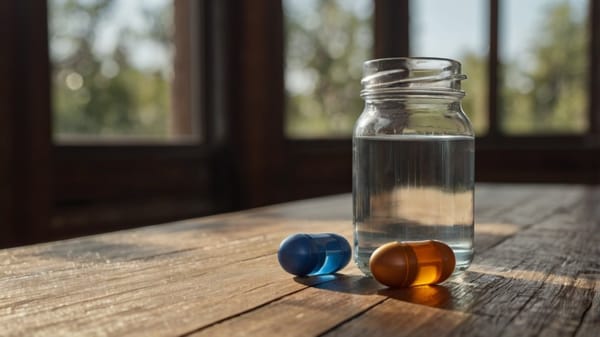The Post-Workout Stack That Helps You Rebuild and Recharge
Train hard? This post-workout stack helps you rebuild faster, feel less sore, and stay sharp—so you’re ready to go again tomorrow.

Feel like your workout takes more than it gives back? You push hard, but an hour later, you're dragging—tight muscles, brain fog, and no gas left in the tank. That crash isn’t weakness. It’s a recovery gap.
The real gains don’t come from what you lift—they come from how you rebuild afterward. With the right post-workout stack, you can bounce back faster, stay sharper, and get more out of every session without adding complexity.
Recovery Doesn’t Wait—It Starts the Second You Stop
The moment you finish your last rep, your body goes into fix-it mode. Muscles start repairing microtears. Glycogen stores start rebuilding. Your nervous system tries to switch gears—from alert to recover.
But here’s the catch: that process doesn’t run on willpower. It runs on raw materials—nutrients, minerals, and bioactive compounds that either help you recover fast or leave you stuck in a cycle of fatigue.
You worked hard. Now help your body make that effort count.
Step One: Protein—The Rebuild Signal
Let’s get this out of the way: you need protein after a workout.
But not just any protein. You want something fast-absorbing and complete. Whey isolate is the gold standard here—it hits your bloodstream quickly and delivers all the amino acids your body needs to start muscle repair.

If you’re plant-based, look for a blend that includes pea, rice, or hemp to ensure full coverage. A scoop within 30 minutes of training can:
- Kickstart muscle protein synthesis
- Curb post-workout appetite swings
- Help reduce next-day soreness
Add it to water, almond milk, or a smoothie. The key is consistency, not complexity.
Add Creatine to Recharge Your Muscles and Your Mind
You don’t need to be lifting heavy to benefit from creatine.
Just 3–5 grams post-workout supports ATP regeneration—the energy currency of your cells. That means:
- Better muscle repair
- More strength in future sessions
- Improved cognitive performance and clarity
Yep, it’s not just for muscle—it helps your brain recharge too. And when taken with carbs or protein (like in your shake), it absorbs even better. Want a simple habit? Toss your creatine into your protein shaker, and you’re done.
Electrolytes: The Underrated Recovery Hero
Most people hydrate with plain water post-workout—and wonder why they still feel off.
Here’s the truth: water isn’t enough. When you sweat, you lose key electrolytes that regulate muscle function, hydration, and nerve signals—especially sodium, magnesium, and potassium. Without them, rehydration falls flat.
A quick fix:
- Mix a clean electrolyte powder or pinch of sea salt into your water
- Sip throughout the hour after training
This tiny tweak helps reduce cramping, lower cortisol, and speed up recovery—especially in hot weather or intense sessions.
L-Glutamine: The Quiet Recovery Booster
You won’t find glutamine headlining flashy supplement ads—but it deserves more attention.
This amino acid plays a dual role in recovery:
- Supports muscle repair after intense training
- Strengthens your gut lining, which often gets taxed under stress or heavy workouts
If you deal with bloating, fatigue, or frequent soreness, 5g of L-glutamine post-training might make a surprising difference.
It’s tasteless, mixes into anything, and pairs well with protein or plain water. Think of it as a quiet background upgrade that pays off over time.
Omega-3s: Smooth Out the Inflammation
Hard training leads to microinflammation—it’s part of the growth process. But excess inflammation stalls recovery and can leave you feeling stiff, sluggish, and mentally scattered.
That’s where omega-3 fatty acids (especially EPA and DHA) come in. A solid dose of fish oil post-workout:
- Supports joint comfort
- Improves mental clarity
- Speeds tissue healing
Take it with your post-workout meal to maximize absorption. Bonus: it also helps stabilize mood and focus—key when you’re juggling life outside the gym.
Magnesium: The Secret Weapon for Recovery Sleep
Recovery doesn’t end with your post-workout shake. It continues into the night—and magnesium is what helps you make the most of that window.
After a tough workout, your nervous system can stay stuck in high gear, making it harder to wind down or fall asleep. Magnesium helps flip the switch:
- Relaxes your muscles
- Calms your mind
- Deepens your sleep cycle
Best taken in the evening, magnesium glycinate or citrate forms work well and won’t upset your stomach.
Just 200–400mg can make a noticeable difference in next-day soreness and energy. Want to sleep like your recovery depends on it? Because it does.
Bonus: Tart Cherry or Collagen for Recovery Edge
Already dialed in the basics and want to go one step further?
- Tart cherry extract (in capsule or juice form) has been shown to improve sleep quality and reduce post-workout soreness.
- Collagen peptides, when taken with vitamin C, can support tendon, ligament, and joint recovery—especially helpful for high-impact or repetitive movement athletes.
These aren’t essential, but if your stack’s feeling solid and you want that extra 5%, they’re worth testing.
Final Thoughts: Recovery Is Where Growth Actually Happens
You didn’t train just to feel wrecked the rest of the day. You trained to feel stronger, clearer, and more capable.
The good news? You don’t need a cabinet full of pills or a PhD in nutrition to recover well. Just a handful of smart, proven tools—used consistently and intentionally—can transform your recovery game.
Here’s your move: After your next workout, reach for your shake, stir in the add-ons, hydrate right, and set yourself up to win tomorrow. You earned the session. Now own the recovery.




